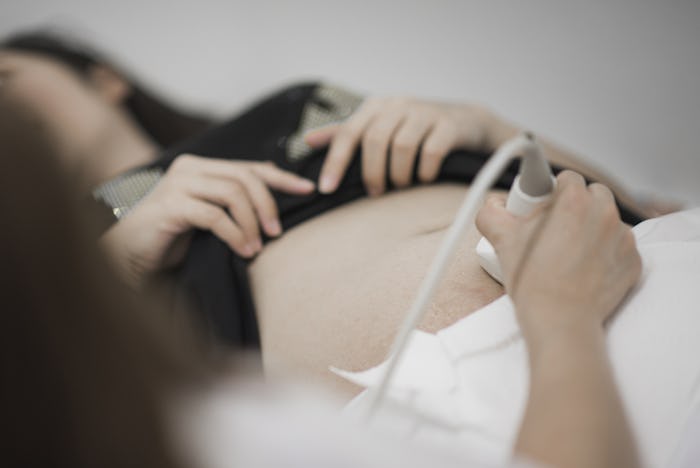Life

Will This Study Force Us To Get Serious About Maternal Mental Health During Pregnancy?
Depression in pregnancy, known as antepartum depression, is all too common. Research has shown that antepartum depression can affect as many as 10 percent of expectant parents, per the World Health Organization, and new research has found that depression during pregnancy may impact baby's biology.
Despite greater awareness around maternal mental health, antepartum depression is still not taken as seriously as it should be — as the authors of a study in Current Psychiatry Reports in 2010 noted, "little attention is given to the main adverse effect of depression during pregnancy, that of maternal suffering from the disease itself." Perhaps the latest findings will provide the impetus to focus on how to alleviate maternal depressive symptoms, to help both mothers and their children.
A new study published recently in the journal Psychoneuroendocrinology discovered that antepartum depression can have a significant physiological impact on an infant, as New Atlas reports. Researchers from King's College London in the United Kingdom monitored over 100 pregnant women, and found that those participants clinically diagnosed with major depressive disorder — around half of the cohort — exhibited increased inflammation and higher levels of the stress hormone cortisol in their saliva, New Atlas reported.
The researchers gave the newborns a standard behavioral assessment following birth, and found that those infants whose mothers had antepartum depression fared worse, according to the study.
Researchers also conducted follow-up tests over a 12-month period, and found that babies exposed to elevated inflammation levels during pregnancy had an increased cortisol response to the stress of vaccination.
Senior study author, Carmine Pariante, told New Atlas that the findings were specific to depression during pregnancy, rather than postpartum:
"Interestingly, the behavioral and biological changes in the baby are not due to mothers' postnatal depression but uniquely to the depression in pregnancy, highlighting the importance of the in utero environment."
This isn't the first study to find a link between antepartum depression and a child's physiological development. Research has shown that in-utero stress can affect a baby's brain growth, as well as put them at greater risk of coronary heart disease or diabetes later in life, according to The Journal of Child Psychology and Psychiatry. Studies have also found that prenatal exposure to stress can also lead to asthma, anxiety, ADHD, and lower cognitive development, as The Conversation has reported.
What's more, a recent JAMA study found that not only are pregnant millennials more likely to have antepartum depression than older generations, but they were more than three times as likely have depression during pregnancy if their mothers were also depressed while pregnant.
Together, these studies illustrate the necessity of focusing on mental health during pregnancy, rather than waiting until after birth. And although the Psychoneuroendocrinology study doesn't provide specific recommendations for clinical practice, the findings do reinforce this point.
Study co-author Sarah Osbourne told MedPage Today that the findings have implications for the way OB-GYNs treat antenatal depression in patients:
"Our results will highlight the importance of actively looking for depression in pregnancy, and will inform clinicians when they are considering the risks and benefits of actively treating depression in pregnancy."
The negative consequences of not treating depression during pregnancy don't only affect a baby's biological makeup. Studies have shown that mothers who have depression but haven't received proper diagnosis and treatment are less likely to bond with their babies, as a report by Scientific American found. The lack of a deep bond, in turn, impairs an infant's behavioral, cognitive, and emotional development, and may cause them to become withdrawn, have trouble interacting, and learn new skills later than their peers, according to research published in the journal Paediatrics & Child Health in 2004.
On the other hand, research has found that the infants of mothers who receive treatment for depression, such as taking antidepressants or anti-anxiety medication, fair better developmentally, the Paediatrics & Child Health study found. These children still face a higher risk of behavioral and emotional issues compared to babies with non-depressed parents.
File it under "additional reasons to pour everything we've got into addressing maternal health" — to help mothers and their children for years to come.